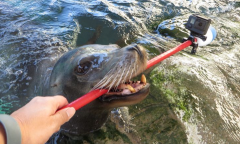By Steve Pak, | February 29, 2016

Baby Lobster
A colorful larval lobster photo snapped by a University of Maine (UM) graduate student has won a National Science Foundation (NSF) award. She is studying climate change's effects on the baby crustacean in the region famous for Maine lobsters. The marine biology grad student submitted one of thousands of images she snapped during her research of the sea creature famous for its large claws and red color after cooked.
Like Us on Facebook
Jesica Waller is in her second year of UM's master's program. Her photograph of the three-week-old colorful lobster won the NSF's visual media award and is also is on the front of the latest issue of the magazine Popular Science.
The magazine's readers chose Waller's photo in the photography category of the yearly Vizzies contest, according to Phys. It honors visual media that shows scientific research.
The UM grad student shot the photo of the tiny lobster in summer 2015 at the Bigelow Laboratory for Ocean Sciences. Lobsters are important to Maine's economy and are in fact the state's most valuable fishery.
One key issue involving Maine lobsters is that they could one day become a valuable crustacean in Canada rather than the United States. That could have a big effect on the New England state's economy.
Lobsters like cold water. However, the oceans in Maine are warming quickly and especially the Gulf of Maine whose temperature is rising faster than 99 percent of the world's oceans, according to Business Insider.
During the past decade fisheries in New York and Connecticut have already experienced drops in lobster catches as the sea creatures move north. During the same time period Maine reported record catches.
A 2013 study shows that Maine lobsters have shifted north around 43 miles (69 kilometers) per decade between the years 1968 and 2008.
It is unclear what will happen to lobster populations in the future. However, a study researcher Malin Minsky of Rutgers University reported that the animals will likely keep moving north as ocean temperatures keep rising.
At the current rate of the lobsters' movement it would take about three decades for most Maine lobsters to live in Canadian waters. Two key factors will be ocean temperatures and greenhouse gases.
Here's a lobster swimming:
-
Use of Coronavirus Pandemic Drones Raises Privacy Concerns: Drones Spread Fear, Local Officials Say

-
Coronavirus Hampers The Delivery Of Lockheed Martin F-35 Stealth Fighters For 2020

-
Instagram Speeds Up Plans to Add Account Memorialization Feature Due to COVID-19 Deaths

-
NASA: Perseverance Plans to Bring 'Mars Rock' to Earth in 2031

-
600 Dead And 3,000 In The Hospital as Iranians Believed Drinking High-Concentrations of Alcohol Can Cure The Coronavirus

-
600 Dead And 3,000 In The Hospital as Iranians Believed Drinking High-Concentrations of Alcohol Can Cure The Coronavirus

-
COVID-19: Doctors, Nurses Use Virtual Reality to Learn New Skills in Treating Coronavirus Patients











